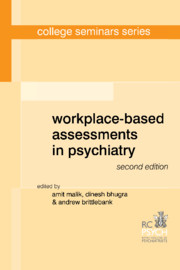Book contents
- Frontmatter
- Contents
- List of tables, boxes and figures
- List of contributors
- Preface
- 1 Introduction: changes in training
- 2 Workplace-based assessment methods: literature overview
- 3 Case-based discussion
- 4 The mini-Assessed Clinical Encounter (mini-ACE)
- 5 The Assessment of Clinical Expertise (ACE)
- 6 Multi-source feedback
- 7 Direct Observation of Non-Clinical Skills: a new tool to assess higher psychiatric trainees
- 8 Workplace-based assessments in psychotherapy
- 9 Educational supervisor's report
- 10 Portfolios
- 11 Annual Review of Competence Progression (ARCP)
- 12 Examinations in the era of competency training
- 13 Piloting workplace-based assessments in psychiatry
- 14 Developing and delivering an online assessment system: Assessments Online
- 15 A trainee perspective of workplace-based assessments
- 16 Conclusions
- Appendix 1 Assessment forms
- Appendix 2 Guide for ARCP panels in core psychiatry training
- Appendix 3 The MRCPsych examination
- Index
4 - The mini-Assessed Clinical Encounter (mini-ACE)
Published online by Cambridge University Press: 01 January 2018
- Frontmatter
- Contents
- List of tables, boxes and figures
- List of contributors
- Preface
- 1 Introduction: changes in training
- 2 Workplace-based assessment methods: literature overview
- 3 Case-based discussion
- 4 The mini-Assessed Clinical Encounter (mini-ACE)
- 5 The Assessment of Clinical Expertise (ACE)
- 6 Multi-source feedback
- 7 Direct Observation of Non-Clinical Skills: a new tool to assess higher psychiatric trainees
- 8 Workplace-based assessments in psychotherapy
- 9 Educational supervisor's report
- 10 Portfolios
- 11 Annual Review of Competence Progression (ARCP)
- 12 Examinations in the era of competency training
- 13 Piloting workplace-based assessments in psychiatry
- 14 Developing and delivering an online assessment system: Assessments Online
- 15 A trainee perspective of workplace-based assessments
- 16 Conclusions
- Appendix 1 Assessment forms
- Appendix 2 Guide for ARCP panels in core psychiatry training
- Appendix 3 The MRCPsych examination
- Index
Summary
The current shift in emphasis in teaching and learning in medicine is towards outcome-based learning. This means that greater importance is placed upon the daily clinical performance of the doctor. The direct observation of the interaction between the doctor and patient is at the heart of any schedule for the assessment of a doctor in clinical practice. The mini-Assessed Clinical Encounter (mini-ACE) was introduced with a particular eye to the learning and assessment needs of doctors at an early stage in career development in psychiatry as a whole or within a chosen specialty. The mini-ACE enables a structured observation of an aspect of clinical practice to occur with accompanying assessment and feedback on defined areas of competence. The tool is of limited value for more advanced trainees or established psychiatrists because of its emphasis on competence rather than performance and lack of content validity with regard to the work of more senior practitioners, the latter owing to its emphasis on small items of the assessment of a patient rather than the whole.
Description
The mini-ACE, which has been developed from the mini-Clinical Evaluation Exercise (mini-CEX), is a method both for assessing the clinical skills of the trainee and offering immediate feedback. It involves a single senior health professional (almost always a doctor) observing a trainee while they conduct a patient assessment in any of a variety of settings. The mini- CEX was itself a modification of the traditional long case assessment, in which the trainee conducts a focused history and/or mental state/physical examination. After asking the trainee for a diagnosis and treatment plan, the assessor rates the trainee using a structured format and then provides educational feedback. Each trainee must be assessed on several different occasions by different assessors and over a range of conditions and settings. The mini-ACE should be conducted as a routine part of the clinical and educational programme.
- Type
- Chapter
- Information
- Workplace-Based Assessments in Psychiatry , pp. 45 - 55Publisher: Royal College of PsychiatristsPrint publication year: 2011

